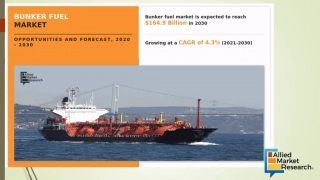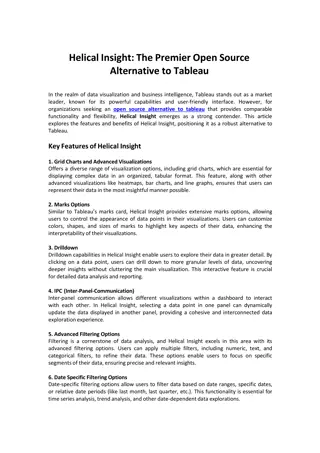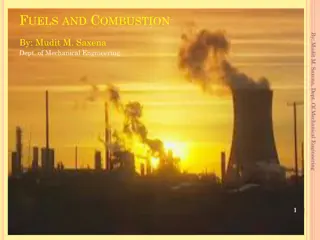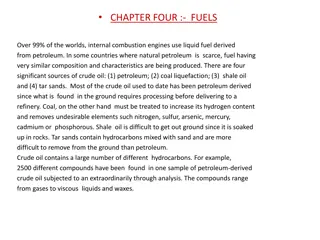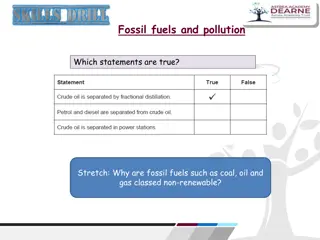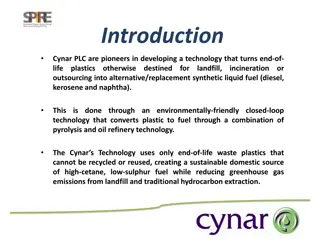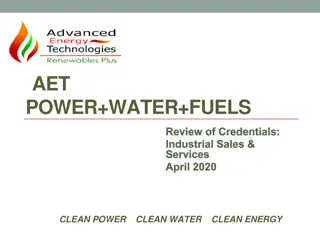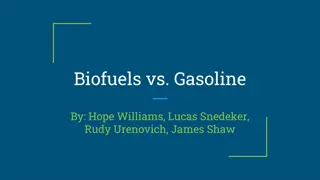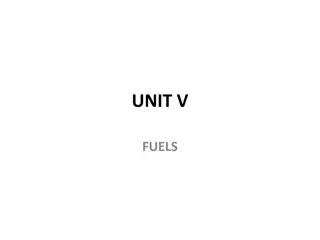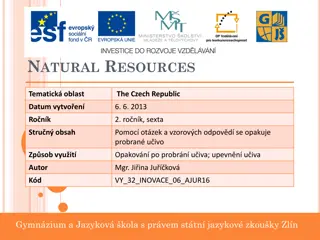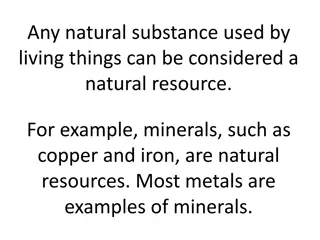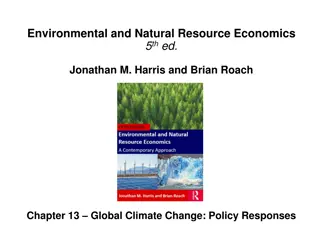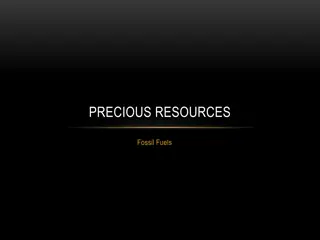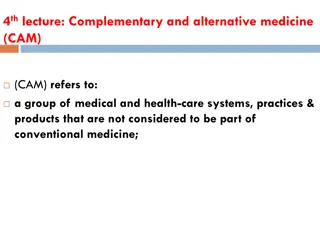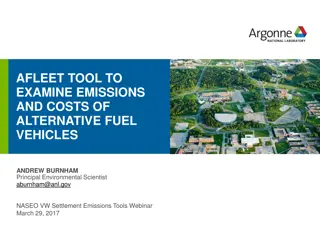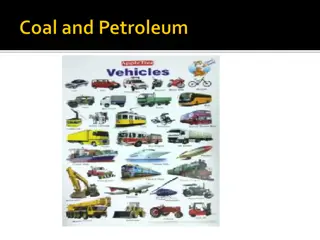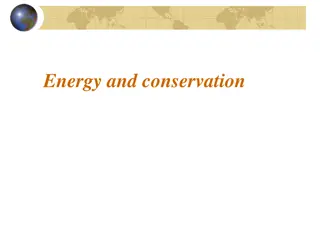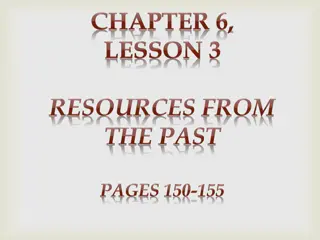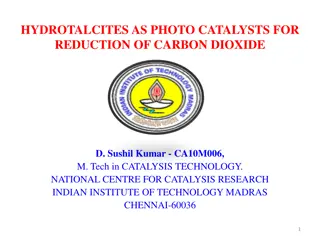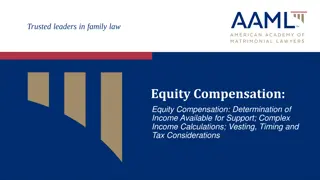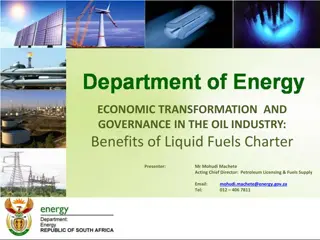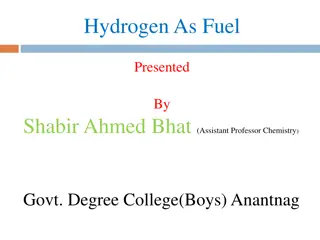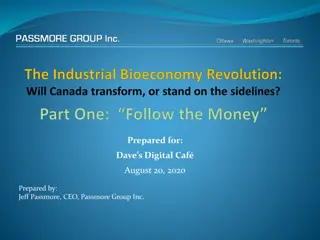Bunker Fuel Market
Bunker fuel is a fuel oil used in marine vessels. It is poured into the ship bunkers to keep the engines running. Ships use three types of marine fuels, which include high sulfur fuel oil, low sulfur fuel oil, and diesel oil. Presently, growth in awareness toward reducing environmental pollution and
2 views • 6 slides
Bunker Fuel Market
Bunker fuel is a fuel oil used in marine vessels. It is poured into the ship bunkers to keep the engines running. Ships use three types of marine fuels, which include high sulfur fuel oil, low sulfur fuel oil, and diesel oil. Presently, growth in awareness toward reducing environmental pollution and
1 views • 6 slides
Bunker Fuel Market
Bunker fuel is a fuel oil used in marine vessels. It is poured into the ship bunkers to keep the engines running. Ships use three types of marine fuels, which include high sulfur fuel oil, low sulfur fuel oil, and diesel oil. Presently, growth in awareness toward reducing environmental pollution and
6 views • 6 slides
Helical Insight an Open Source Alternative to Tableau
In the realm of data visualization and business intelligence, Tableau stands out as a market leader, known for its powerful capabilities and user-friendly interface. However, for organizations seeking an open source alternative to tableau that provides comparable functionality and flexibility, Helic
0 views • 2 slides
Fuels and Combustion in Mechanical Engineering
This content delves into the intricate world of fuels and combustion, discussing classifications, properties, and origins of various fuels such as solid, liquid, and gaseous. It covers the importance of desirable fuel properties, caloric values, and the different types of natural and artificial fuel
0 views • 34 slides
Fuels and Their Sources
Fuels derived from petroleum, coal, shale oil, and tar sands are crucial for powering internal combustion engines. Crude oil contains various hydrocarbons requiring refining processes to obtain products like natural gas, gasoline, kerosene, diesel oils, fuel oils, and lubricating oils. The chemical
1 views • 7 slides
Complementary and Alternative Medicine (CAM)
Complementary and Alternative Medicine (CAM) encompasses various treatments, ranging from herbs to yoga, that differ from traditional Western medicine. While complementary medicine involves using these therapies alongside conventional medicine, alternative medicine opts for non-mainstream approaches
3 views • 20 slides
Fossil Fuels and Pollution: A Comprehensive Overview
Fossil fuels such as coal, oil, and natural gas are non-renewable energy sources that release heat energy when burned, but also contribute to pollution when not burned completely. This leads to the release of harmful pollutants like carbon dioxide, carbon monoxide, sulfur dioxide, and carbon particu
2 views • 9 slides
Innovative Fuel Technology by Cynar PLC: Converting Plastic Waste into Sustainable Fuels
Cynar PLC pioneers technology converting end-of-life plastics into synthetic liquid fuels, reducing landfill waste and greenhouse gas emissions. Seeking partners for future fuel development and renewable energy projects. Advanced discussions with potential collaborators. Opportunities to combine alt
0 views • 5 slides
AET Power, Water, and Fuels: Industrial Solutions and Innovations
AET is a leading provider of end-to-end power, water, and biomass fuels project development services. Their core mission focuses on clean energy solutions and promoting green technologies across various industrial disciplines. With a strategic product line encompassing solar rooftop projects, gasifi
0 views • 12 slides
Pros and Cons of Biofuels in Comparison to Gasoline
Biofuels, renewable liquid fuels made from biomass, have various environmental and socio-economic benefits over gasoline. They can replace fossil fuels, reduce greenhouse gas emissions, create jobs, boost economies, and utilize common wastes efficiently. However, challenges like production costs, su
1 views • 11 slides
Fuels and Their Classification
Fuels are combustible substances that serve as a source of heat or raw material for various industries. They can be classified as natural or artificial, solid, liquid, or gaseous, and primary or secondary fuels. Primary fuels like coal and wood are directly used for heat, while secondary fuels are m
5 views • 88 slides
Management of Symptomatic Ear Wax in Adults: Olive Oil Drops vs. Alternative Solvents
Adults (>18 yrs) presenting with symptomatic ear wax often seek interventions like olive oil drops or alternative ear wax solvents. A study compared the efficacy of olive oil drops in conjunction with syringing versus alternative treatments or no treatment. PubMed search yielded 26 papers, with 2 re
5 views • 12 slides
Energy Conversion in Steam Engines
Explore the energy conversion processes in steam engines, learn about fossil fuels like coal, oil, and natural gas, and discover the composition of fossil fuels. This lesson covers the operation of steam engines, energy changes, advantages, and disadvantages, providing a comprehensive overview of en
2 views • 14 slides
Natural Resources and Mineral Deposits in the Czech Republic
The Czech Republic's natural resources include renewable sources like sun energy and water, as well as non-renewable resources such as mineral deposits and fuels like black coal and oil. The country has rich non-metal deposits and varied metal deposits. Mineral deposits are abundant, with significan
0 views • 8 slides
The Evolution of Alternative Fuels in Addressing Energy Security
Amid historical warnings of overdependence on foreign oil, this piece emphasizes the importance of exploring alternative fuels to ensure energy security. With a focus on real-time solutions and the potential of existing technologies, the narrative underscores the urgency of transitioning away from t
0 views • 23 slides
Advances in Aviation Fuel Surrogates and Computational Modeling
This study explores the formulation of petroleum and alternative jet fuel surrogates, coupling chemical kinetics with computational fluid mechanics for engine design, and the variability of aviation fuels. It delves into the concept of surrogate fuel models, previous research on jet fuel surrogates,
0 views • 20 slides
Nonrenewable Energy Resources and Fossil Fuels
Natural resources like minerals are essential for various purposes, but most minerals are nonrenewable resources. This means they cannot be replaced within a short timeframe. Fossil fuels, such as coal, oil, and natural gas, are ancient forms of energy derived from buried plant and animal remains, m
0 views • 30 slides
Policy Responses to Global Climate Change: Alternative Carbon Taxes and Impacts on Fossil Fuels
The chapter discusses the implementation of alternative carbon taxes on fossil fuels and their effects on retail prices of gasoline, coal, and natural gas. It provides insights into the impact of carbon pricing on emissions, retail prices, and consumption patterns, emphasizing the importance of carb
0 views • 15 slides
Unveiling the World of Fossil Fuels: Coal Formation and Usage
Exploring the formation of fossil fuels, particularly coal, from ancient plant remains buried under the Earth's surface over millions of years. Learn about the transformation process from peat to brown and black coal, and how coal is utilized as a valuable fuel source for electricity generation and
0 views • 16 slides
Overview of Complementary and Alternative Medicine (CAM)
Complementary and Alternative Medicine (CAM) encompasses diverse medical practices, products, and systems outside conventional healthcare. CAM includes treatments like acupuncture, herbal remedies, and meditation. Epidemiological data shows widespread usage, particularly for conditions such as back
1 views • 20 slides
AFLEET Tool for Examining Emissions and Costs of Alternative Fuel Vehicles
AFLEET is a tool developed by Argonne National Laboratory to analyze the emissions and costs of alternative fuel vehicles. It provides insights into the benefits of using different fuel technologies and helps in decision-making for vehicle fleet management. The tool includes calculations for emissio
0 views • 25 slides
National Fuels Supplier Engagement Overview
National Fuels Supplier Engagement provides commercial services to the public sector, saving money for the taxpayer by managing procurement activities for common goods and services. Crown Commercial Service (CCS) works with a vast network of customer organizations and suppliers, aiming to achieve va
0 views • 13 slides
Fuels and Their Uses
Fuels are substances that release energy when burned, such as coal, petroleum, and natural gas. They are used in transportation, cooking, heating, electricity production, and industrial processes. Good fuel characteristics include being economical, easily available, non-toxic when burned, high heat
0 views • 9 slides
Networking Discussions at RA Ballantyne Conference - April 21, 2015
Networking discussions at the RA Ballantyne Conference held on April 21, 2015, focused on engaging with key industry players such as Pioneer, Parkland, Canadian Tire, Wilsons Fuels, McDougall Energy, MacEwen Fuels, UPI Energy, Valero, and CST. Various stakeholders expressed interest in the POST prog
0 views • 7 slides
Achieving UK Net-Zero: Strategies for Carbon Capture and Low-Carbon Fuels
Explore the pathways to achieving UK net-zero carbon emissions through carbon capture, low-carbon alternative fuels like hydrogen and bioenergy, and sustainable bioenergy practices. Learn about the importance of zero-carbon hydrogen production and the challenges and benefits of utilizing bioenergy f
0 views • 12 slides
Energy Sources, Conservation, and Global Impact
Explores the main energy sources, focusing on fossil fuels and their implications, such as global warming and greenhouse effect. Discusses the process of fractional distillation for oil and the consequences of burning fossil fuels. Highlights the significance of mitigating climate change to prevent
0 views • 17 slides
Fossils and Fossil Fuels
Explore the world of fossils and fossil fuels, learning how they are formed and what they reveal about Earth's history. Discover the various types of fossils, from imprints to whole organisms preserved in amber. Uncover the importance of fossils in studying geological changes over time and understan
0 views • 15 slides
Utilizing Hydrotalcites as Photo Catalysts for Carbon Dioxide Reduction
Burning fossil fuels leads to CO2 emissions, posing a significant environmental challenge. Converting CO2 into valuable hydrocarbons through photocatalytic reduction using solar energy provides a sustainable solution. This process involves multi-electron transfer steps, requiring efficient catalysts
0 views • 24 slides
Alternative Investments and Equity Compensation
Explore the world of alternative investments including private equity, venture capital, and hedge funds with a focus on equity compensation. Learn about complex income calculations, vesting, timing, and tax considerations. Discover how these unconventional assets with high return potential differ fr
0 views • 61 slides
Economic Transformation in Oil Industry: Benefits of Liquid Fuels Charter
Presentation by Mr. Mohudi Machete on the Petroleum Licensing & Fuels Supply, discussing the legislative mandate, objectives, and impact analysis of the Petroleum and Liquid Fuels Charter (LFC) in the South African oil industry.
0 views • 18 slides
Fossil Fuels, Energy, and the Carbon Cycle
Exploring the relationship between fossil fuels, energy production, and carbon emissions. Learn about the carbon cycle, photosynthesis, and the impact of human activities on the environment. Delve into the extraction of hydrocarbons, coal mining, and personal experiences in petroleum production. Gai
0 views • 39 slides
Fossil Fuels: Advantages, Disadvantages, and Impact
Fossil fuels like oil, coal, and natural gas have both advantages and disadvantages. They offer cheap energy with a high power output but contribute to pollution and are non-renewable. The method of processing fossil fuels in power plants is explained, highlighting their impact on the environment an
0 views • 11 slides
Strategies for Decarbonizing Shipping Industry
Infographic series released under CC-BY-NC-ND licensing by UMAS highlight the pathways for reducing greenhouse gas emissions in international shipping. Efficiency measures and transition to renewable energy and zero-carbon fuels are essential to meet the IMO's emission reduction targets. The use of
0 views • 8 slides
Hydrogen as Future Fuel: Potential, Efficiency, and Production Methods
Hydrogen, the most abundant element in the universe, holds promise as a clean and renewable fuel for the future generation. Its high energy density, zero-emission characteristics, and various production methods like reforming fossil fuels and electrolysis of water make it a versatile and sustainable
0 views • 24 slides
Comparing Different Types of Car Technologies for Environmental Impact
Exploring the environmental impact of various car technologies including biofuels, fossil fuels, electric cars, hybrids, and fuel cells. Each technology has its own advantages and challenges in terms of energy efficiency, emissions, cost, and infrastructure requirements. Biofuels offer a renewable e
0 views • 6 slides
Challenges and Future of Fossil Fuels in the Global Economy
The world's dependence on fossil fuels is declining, as evidenced by recent actions from major financial institutions and companies shifting away from investments in coal, oil sands, and Arctic drilling. Experts suggest that businesses adapting to a net-zero carbon world will thrive while those resi
0 views • 13 slides
Alternative Learning Centers - Pathways and Programs for Success
Providing continued education and support for disruptive students, the Alternative Learning Centers offer different forms of alternative education, including last-chance school programs. The National Alternative Education Association (NAEC) emphasizes standards-based evaluation and essential charact
0 views • 23 slides
Modern Motor Fuels and Lubricants Overview
Coverage of various motor fuels including traditional and alternative options for different transport modes. Explanation of lubricants used in engines and machinery for efficient performance.
0 views • 35 slides
Environmental Impact of Conventional Fossil Fuels: Advantages and Disadvantages
There are advantages and disadvantages to using fossil fuels such as coal, petroleum, and natural gas. While these fuels are relatively cheap and easy to use, they also cause major environmental damage through land degradation and air pollution. Extracting and burning fossil fuels release harmful su
0 views • 9 slides


